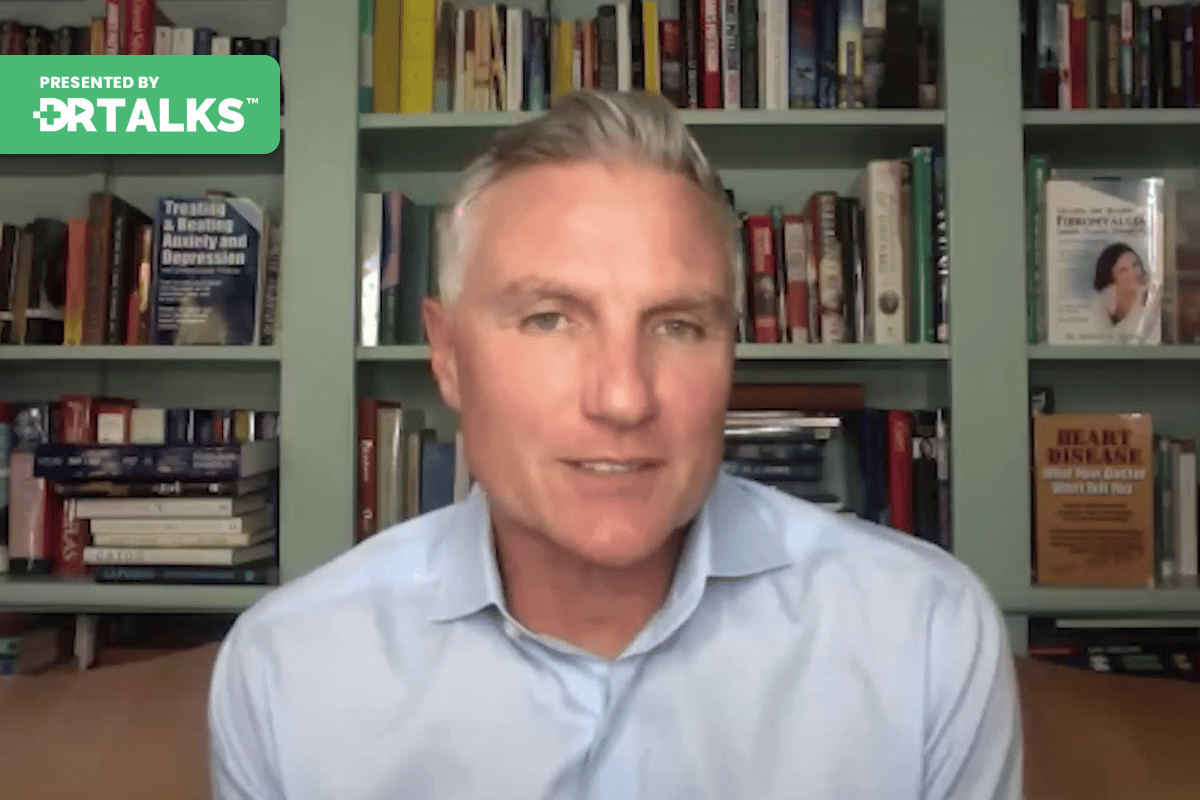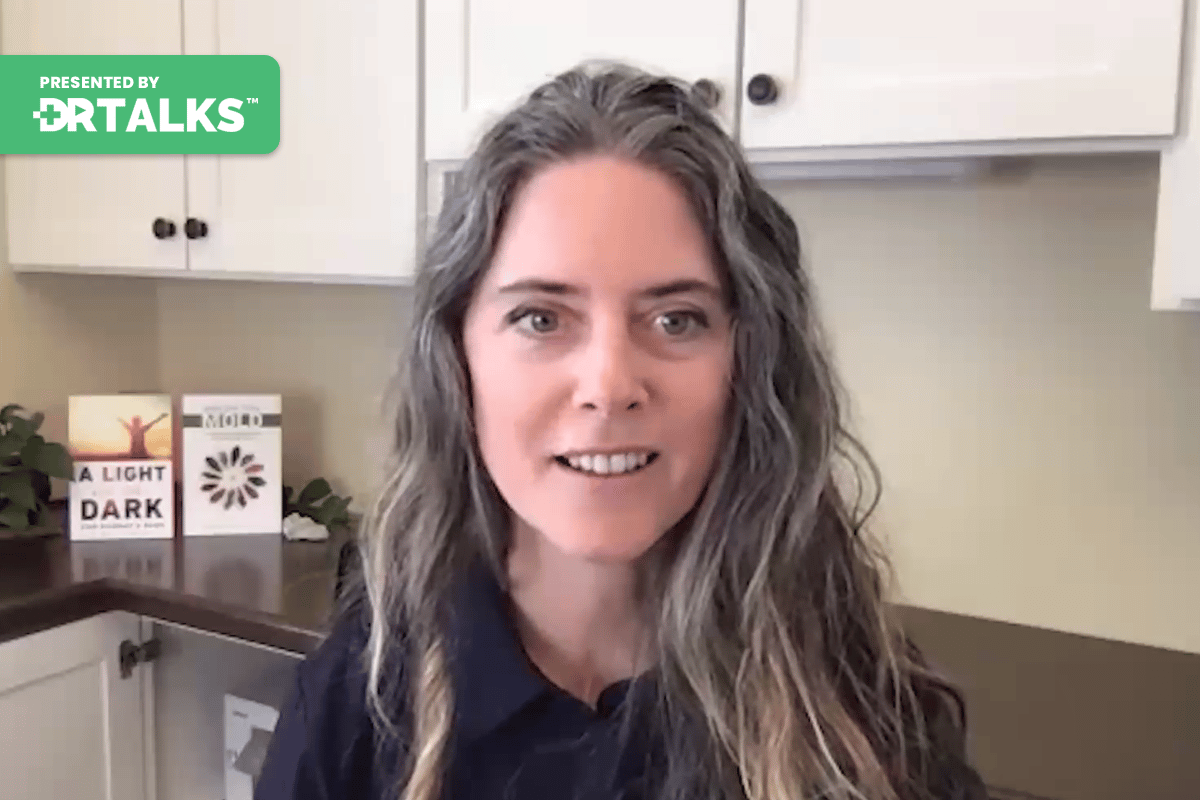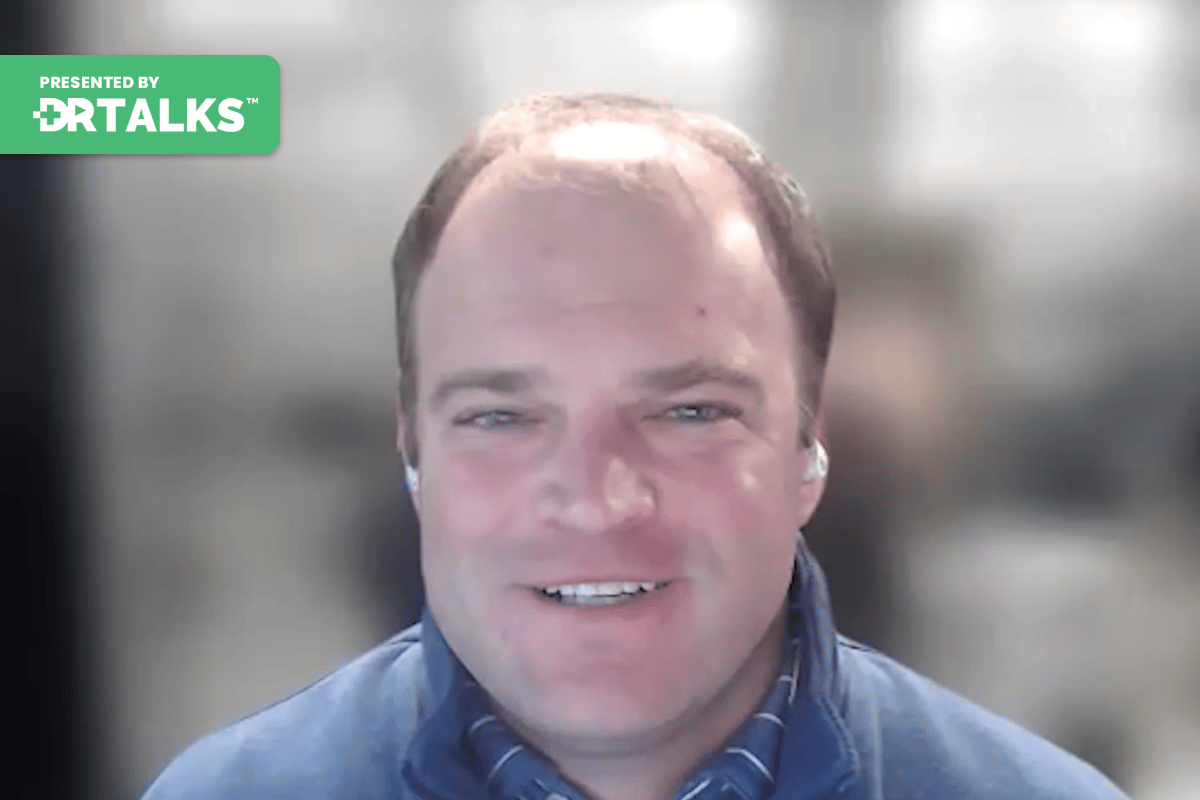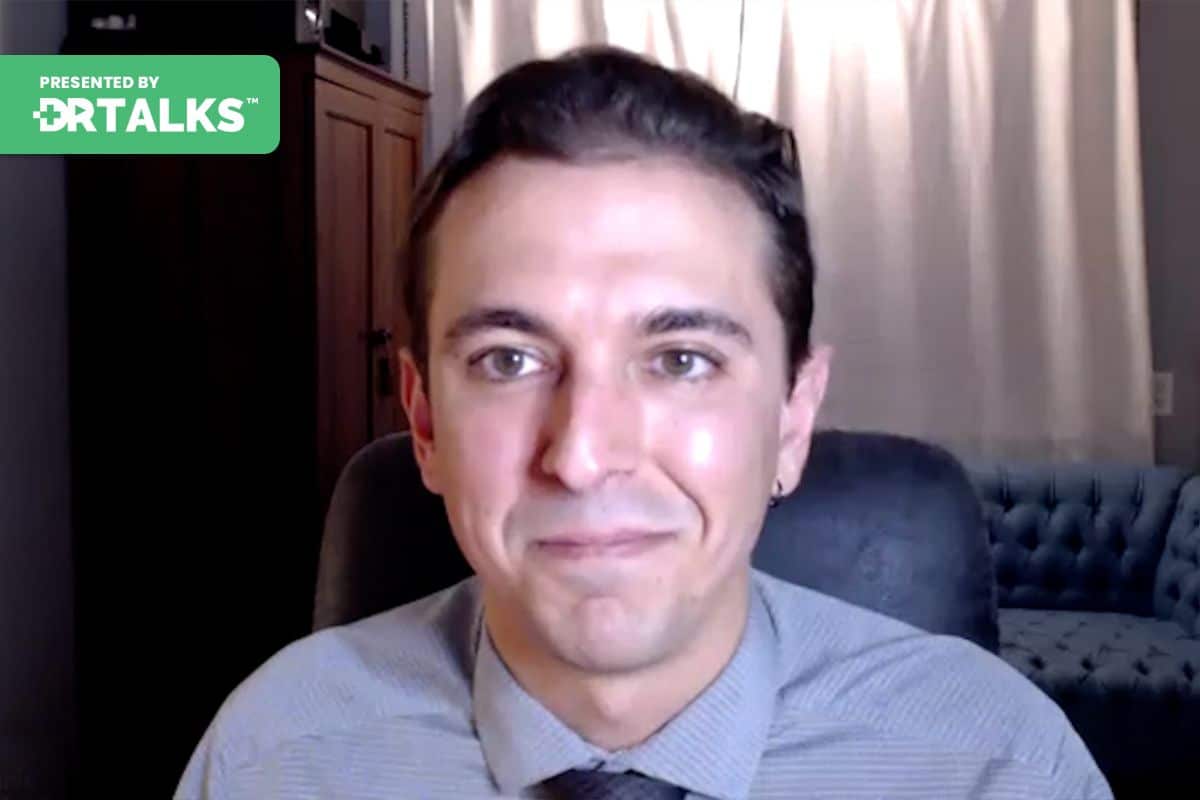Join the discussion below

Eric Gordon, MD is President of Gordon Medical Research Center and clinical director of Gordon Medical Associates which specializes in complex chronic illness. In addition to being in clinical practice for over 40 years, Dr. Gordon is engaged in clinical research focused on bringing together leading international medical researchers and... Read More

Dr. Rodger Murphree is a chiropractic physician and board certified nutritional specialist. He is an internationally recognized fibromyalgia expert. His “Murphree Method,” a combination of functional and orthomolecular medicine, has helped thousands of patients get healthy and feel good again. He’s the author of 3 books for patients and doctors including... Read More
- Symptoms that could be either long haul or fibromyalgia including achy pain, brain fog, and fatigue
- Why estimates show that fibromyalgia and CFS will skyrocket due to long haul
- Why functional medicine offers a great change of preventing and overcoming long haul symptoms
Eric Gordon, MD
Welcome welcome to another. I always call it an addition, I guess it’s another interview and long haul C0V!D and chronic fatigue and as you know, I think from our conversations that were really including all the chronic illnesses that are related to immune function. And today it’s my pleasure to introduce Dr. Robert Murphree. Dr. Murphree is a chiropractor and nutritionist, nutritionist who has really spent the last 36 years exploring nutrition, functional medicine and has become an expert in the treatment of fibromyalgia. He’s written several books and um I’m just very excited to talk to today because he’s also been dealing with the long C0V!D in his patients. And I think we’re gonna learn some interesting things that are gonna help round out the story. So without further ado what has been the connections that you’ve seen with long C0V!D and your fibromyalgia patients?
Rodger Murphree, DC, CNS
Well, Eric first of all I’m delighted to be here, there’s gonna be a lot of fun. That’s my favorite, my favorite topic. I wish we didn’t have to talk about fibromyalgia, but it’s something I’ve devoted my life to the last 22 years specializing in fibromyalgia. You know what’s really interesting about C0V!D is two years ago when everything, you know, started to show up 2.5 years ago, whatever it was, my patients were freaking out because we thought, oh man, you know, they’re already at the lowest, they could be health wise are already really facing a lot of health challenges. But there’s really no connection with C0V!D being more of an issue for fiber, imagine than anything else other than we know, obesity and autoimmune diseases. Maybe some respiratory disorders can make you more vulnerable to C0V!D. But what I’m seeing now is that my patients with fibromyalgia that years ago that I treated and got them was able to help them overcome fi bro. Now they’re developing all these symptoms that we would associate with fibromyalgia, brain fog, diffuse a key pain, fatigue, poor sleep anxiety.
These are common things that we see in long hauler. And what’s really interesting to me is we’re seeing that. And I think the estimates, I’m sure people have shared this. The estimates are anywhere from 30 to 50% of people who get C0V!D go on to develop long hauler symptoms and 30% of the cases of long haulers. The symptoms mirror that of fibromyalgia. Exactly. And ironically kind of a little bit different. It’s more in men than is in women. Even though traditionally, 95% of people who have fibromyalgia or women, what I really see is, you know on the horizon is we’re gonna get all these people are gonna get diagnosed with fibromyalgia and it’s really gonna be the fact that it’s long hauler is really what it is or they have, maybe they have fibromyalgia. Um, you know, maybe it was their kind of underneath the surface smoldering. But along comes this stressful event is this infectious disease that then just triggers all these symptoms. And so it’s really gonna be an interesting few years I think to see how this all pans out.
Eric Gordon, MD
So tell tell us more just about fibromyalgia and then we can tie it in together because that’s something that, you know, people know the term. But they don’t realize.
Rodger Murphree, DC, CNS
Yeah. You know, obviously, you know, you’re very familiar fibromyalgia but you’re right. I mean most people maybe have heard the term, I’m not really sure what it is. And unfortunately, even though the criteria to be diagnosed with fibromyalgia came about in the early 1990s. So, you know, 30 something years ago by the American College of Rheumatology, we still have people who don’t know if I ever manages. We even have doctors who don’t acknowledge that it’s real now. That’s sad, but true. And I mean, here we are today, 30 some years later and we still have some doctors who don’t acknowledge the existence of this thing called Fibromyalgia. But fibromyalgia is syndrome. So syndrome is a group of symptoms that people have in common and we give it a name. So for fibromyalgia, that syndrome, those symptoms are diffuse a key sometimes disabling pain, insomnia fatigue, irritable bowel syndrome, anxiety, depression, brain fall, these are the very typical symptoms that we would see in fibromyalgia. Now, those symptoms are not caused by fibromyalgia. I mean, fiber manager is just a name, right? I mean it’s a name like irritable bowel as a name to describe the symptoms of irritable bowel, you know, bloating and gas and constipation, loose bowel movements. So really the key for fibromyalgia is finding and fixing these underlying causes, which is exactly what we do in functional medicine.
Eric Gordon, MD
Yeah. And I just wanna give a shout out to the government which has neglected fibromyalgia and chronic fatigue for all these years. And I think just because of the numbers of people they are actually investing in studying these issues and really looking into long C0V!D. And I think I’ve said many times on this series that the unfortunate thing is they’re still not willing to try basically safe therapies with people, they’re still kind of like just acknowledging giving people the label and then say, well when we figure it out, we’ll treat you.
Rodger Murphree, DC, CNS
Yeah, yeah, yeah. So that is the silver lining of, you know what we’re seeing in long hauler syndrome as we’re seeing that the National Institute of Health is actually giving some money uh to study fibromyalgia and chronic syndrome, to neglected illnesses. And unfortunately, you know, with fibromyalgia and particularly most doctors have come to the false conclusion that if you develop fibromyalgia, you just have to learn to live and it’s all about just managing the symptoms, but you know, if you’re someone who can barely get out of bed, you know, just chronic pain. You can’t even get a thought together. You know, trying to manage, you know, trying to learn to live with it, I mean that’s not living, that’s just existing and you know, it’s, it’s incredibly frustrating to hear that from, from, you know, your doctor to say, hey, you’re just gonna have to learn to live with it.
You know, and they’ve come to this false conclusion because of the drugs, the common drugs used to treat the symptoms long term our failure and oftentimes these medications create unwanted side effects. And, and so what we, what we, you know, for the last decade or so, doctors have tried to come up with the magic pill, whether that was Cymbalta and Savella Lyrica and, and then they try to come up with the magic pollen pharmacy with always different different drugs to treat the different symptoms and what we saw was that actually made things worse at least long term. And so doctors came away with that in the conventional medicine anyway, came away with that saying, well, you know, it’s not, it’s not me, it’s, it’s, you, you know, either you’re lazy or crazy or overweight or you know, whatever it is, they blame it on the patient or they just realize that, you know, pharmaceutical, the pharmaceutical approach alone is not going to help these people and they’ve kind of just thrown their hands up.
Eric Gordon, MD
Yeah, I know that that is, you know, the story of all these diseases and, and we’re gonna hopefully, keep learning. But what’s exciting to me is you’ve been treating this successfully for a long time and what have you found, I mean, you know, the pearls that you found in, and which ones do you think may benefit people who have similar symptoms from long C0V!D.
Rodger Murphree, DC, CNS
You know, it’s interesting because when I and I always preface this, that sounds so simple, but it’s really about getting healthy, you know, and that’s really complicated though. Right? If you’ve got a complicated illness like fiber magical long hauler, number one, what’s the trigger? I mean, where are these symptoms coming from? So until you know that you’re really at a big disadvantage. You know, folks try for years, different supplements and drugs and diets and all these different things out there that rarely make a difference. And so what I’ve learned the hard way over the years, both having a very large integrated medical practice where we used all kind of different prescription drugs very judiciously. But we, you know, we combined conventional medicine and alternative stuff for more natural stuff. But what I came away with that was that the only way for these individuals to feel good again was to get healthy. And that meant different things to different people because everybody’s a little bit different.
I mean, as you know, we’re as different on the inside as we’re on on the outside the way, you know, we’re just genetics and and environment that we’re in and the thoughts that we think and all these things, but the number one denominator for these folks is to raise their pain threshold. So in fibromyalgia, it’s brought on by a thing called a lasagna and central sensitization pain syndrome where pain is magnified. And so these folks have a pain threshold that’s really, really low. And so pain is magnified. And the key is though, to raise that pain threshold. So it doesn’t matter where that triggers coming from. It doesn’t matter if it’s old scar tissue, Doesn’t matter if it’s nerve damage from metabolic syndrome or type two diabetes, or doesn’t matter if it’s osteoporosis or osteoarthritis or an autoimmune type of arthritis. If we can raise that pain threshold, then that pain goes down. And that’s the big first step. And a big part of that is just shoring up in any nutritional deficiencies or hormonal deficiencies that these folks have developed over the years.
Eric Gordon, MD
Yeah. That, you know, what you describe call is, is looking looking for the weak link in them, you know, I mean, and that’s what’s so nice about your, you know, your broad approach to like where is the the weak spot in that system because even though you have the increased pain, some people, it’s much more in their guts and some people, it’s much more in their heads and with headaches and, and so when you go, when you go through your process, is there anything that you have found? You know that would be helpful to guide people who have, let’s say like more of an era bowel syndrome presentation or more of a headache presentation or even more importantly these days, more of a brain fog presentation.
Rodger Murphree, DC, CNS
Yeah, so the fibromyalgia, 70% of the fibromyalgia have irritable bowel syndrome and the connection is this central sensitization pain syndrome where pain is more magnified and the connection there is really has to do, I think with serotonin. So the brain chemical serotonin, this neurotransmitter, what we know is in fibromyalgia, they’re really low in this brain Chemical serotonin. Well actually you have more serotonin receptors in your intestinal tract than you do in your brain. So, you know when you get nervous you get butterflies in your stomach. But what we see is that when you’re low in serotonin, you have an elevation of a thing called substance P, another hormone and as substance P is elevated your pain threshold goes down. So pain becomes magnified. So one of the big steps whether it’s irritable bowel or fibromyalgia is to make sure that we get that serotonin level built back up and one of the best ways to do that is deeper storages sleep well for my patients that’s where I start and it really, you know, if you think about it, you know, until the audience doesn’t know this, but you were on, I interviewed you not too long ago, we were talking about this cell danger theory, which is just fascinating uh conversation that we had. But what people don’t really realize is the importance of deep restorative sleep. What happens when we’re asleep?
A big part of that, that’s when the body is repairing itself. And if you’re never getting that time to repair, then you’re just building up toxins and inflammatory chemicals and you know, I think the two drivers of all unwanted health conditions are stress, whether it’s real or imagined, you know, and then inflammation. And so for my patients, I start with making sure they’re getting deep restorative sleep because that’s classic for fibromyalgia is having problems with insomnia. That’s also what I’m seeing in my long hauler patients as well. The majority of them are struggling with their sleep. Which sets up kind of a slippery slope because if you’re not sleeping well, we know that not only is the body not preparing itself, but you increase your inflammatory chemicals by 40%. We know that your increased risk, you know, obviously not sleeping well, you’re gonna be tired and we know your increased risk for having problems with mental clarity issues, brain fall, you’re at risk for irritable bowel syndrome, restless leg syndrome, metabolic disorder, weight gain. So the first place to start for me, no matter what the illness is, is definitely making sure they’re getting that deep delta wave sleep.Night after night after night.
Eric Gordon, MD
Yeah. And you know that is something that has been repeated in this series to sleep and just one thing. But you know the frustrating thing that patients have of course is they said, well if I could sleep yes, I would feel better. So you know, it’s not like you know they you know, they’ve gone through the what called the medical mill of being told that they have to you know get to bed at a certain time and keep the room dark, which is really important. I mean basic stuff. But are there other tricks that you found in, you know, like for subsets of patients? I know that the frustrating thing for all of our patients is what works for their friend or their cousin doesn’t always work for them.
Rodger Murphree, DC, CNS
Well, you know, I think so. The short answer to that is there is some supplements from over the counter natural therapies that work very well for these individuals and for people long hauler. But to get healthy, the long game is the diet. You know, you can’t get healthy eating an unhealthy diet, you know, you can’t get around it. So answering that in two parts one is I find that as far as fibromyalgia being low in serotonin, we can fix that by making sure they’re taking an amino acid five hydroxy tryptophan. So amino acid is an approach, you know makes up our protein. So anytime we’re eating a protein we’re getting these amino acids, one of those essential amino acids meaning that you have to get it in your diet. Your body can’t make it, it’s tryptophan and then tryptophan turns into five hydroxy tryptophan. And then when that’s combined with the right synergistic B vitamins, vitamin C, the magnesium that turns into serotonin. And by getting them on five HTP and a good multivitamin. I’ve developed my own that has special things in there but that combination allows them to make serotonin and by doing that they raise their pain threshold, they have less pain. Their moods are better. They have more mental clarity starts to improve, irritable bowel starts to improve. So five HTP can be a godsend for these individuals. Now if you don’t have fibromyalgia it may not generate that improvement. But for federal that is key is to get that serotonin level up. Very important.
Eric Gordon, MD
That’s is, I like the way you lay that out because you know people do get frustrated when they keep trying supplements and they keep just making them nauseous or make them feel worse and yeah and that’s you know that’s why you know seeking professional help can help sometimes because it can keep you from going down a path that isn’t going to be helpful. So and so getting back to your because I said the I. B. S. Component, you know so you said getting that, getting the this basically getting that central nervous system to not be as quick to react is really really important. Any other you know simple things that you feel that people should just like you know just kind of try and see what happens.
Rodger Murphree, DC, CNS
Well you know with your it’ll balance again. It’s classic. We see that with fibromyalgia and a big part of that is their low in serotonin. So with irritable I mean you can go back and forth. You know you have irritable a where you alternate between diarrhea and constipation. Everybody it’s all mostly loose bowel movements in irritable C. Which is constipation but it about A. And D. Where most you know you’ve seen these loose file movements a lot of times it’s because they’re deficient in serotonin and again it’s in the brain but more of it’s even in your gut and serotonin helps regulate the motility that how food moves through the intestinal track. And when you get depleted in it or getting a lot of stress then that serotonin reaction is sabotaged. And now we see that people start having these loose by amendments and start having flares and those of you have your bow. You know that typically this happens anyway when you get under a lot of stress that’s that sets up the flare and so what I’ve found over the last couple of decades is that once I get that serotonin level built back up with five HTP and a good digestive enzyme. I think most people have depleted their digestive enzymes by the age of 35 eating a lot of processed foods. And and so their body really can’t produce these digestive enzymes or they don’t have the stomach acid that they need. If they’ve eaten all kind of junk and their stomach acid is no longer there. So good digestive enzyme and five HTP often times will stop these loose bowel movements that in a good multivitamin. Those who have constipation.
I’m sure you do as well is a big part of that is, you know, digestive enzyme or butane hydrochloric acid and making sure they’ll be able to digest that food. And then the next thing is to make sure that they’ve got plenty of magnesium, which is a natural muscle relaxer relaxes tight muscles and fibromyalgia, a key muscles but also relaxes tight Coghlan’s And anytime you get under stress, your body is using certain chemicals to deal with that stress. One of those chemicals is magnesium, which is in 300 different bodily reactions. So anytime you get under stress, you’re at risk of depleting magnesium and then you have this domino effect of sabotaging these 300 different processes, mental clarity regulating our blood pressure. helping with our moods, magnesium as you know, is needed to make these happy hormones. So to me it’s once I can really kind of shore up these nutritional deficiencies. We see a lot of positive traction starting to happen and then you, you know, you kind of build on that.
Eric Gordon, MD
Yeah, I know that’s beautiful. I think it’s one of the things I realized that we’re doing this summit that I keep feeling like, you know, each subject really needs its own deep dive. You know, that, that, you know like where the issue of bowel since C0V!D, you know, lungs and bowel are probably the major places that most people have trouble with, you know, the kidneys and heart also, but the lungs and bowels are big target, and supporting that is so important. So just so we kind of have, and I think once you get that going and then you’re probably, if your sleep improves a little bit that maybe your headaches or your brain fog are gonna start coming down the, you know, improving as well. Has that been your experience?
Rodger Murphree, DC, CNS
Well, if you think about it and really it’s almost too basic. I think that’s what I say is, you know, that sounds kind of simple, but really what I tried to do over the years is take a very complex illness that a lot of people didn’t understand and and make it so that it can be, you can navigate it, you can’t overcome it and early years, 20 something years ago when I have patients coming in with fiber getting referred to me because I was having some success I would I would lay awake and I think oh my God what am I good you know what am I gonna do this personally got 30 different symptoms you know where do I start, What do I do? And over the years though I’ve been able to figure out and have this thing called the Murphree method which is not very original but it’s really based on you know the principles of functional medicine finding and fixing the underlying causes. And if we look at the common symptoms whether that’s long hauler or fibromyalgia of the pain and the fatigue and the brain fog and the low moods and the real bow again what’s the common denominator, poor sleep. So if you can fix that that’s big that’s that’s really big. But then what we see is that those of fibromyalgia, they’ve depleted their stress coping chemicals. So I kind of use the analogy that we’re all born in the stress coping savings account and in that stress coping savings account we have certain chemicals and hormones that allow us to deal with stress.
So we have cortisol and D. H. E. A. And serotonin and dopamine and gamma amino butyric acid and pathetic acid and magnesium. And anytime we’re under stress our bodies releasing these chemicals to allow us to be able to deal with that situation real or imagined. So stress really is the catalyst that kind of drives this disease and a big part of turning that around is making sure that we build up their stress coping savings account which has become depleted, they’ve bankrupted those chemicals and there and so stress becomes more magnified little things that probably didn’t bother them pre fiber manage or pre C0V!D now start to become magnified, so bright lights, loud noises, things that you know, you wouldn’t think would give you any issue. But it does for these folks and a big part of turning that around is using high doses but safe doses and the right combination of vitamins, minerals amino acids and essential fatty acids, the very building blocks that that person needs to be able to navigate stress and not feel so overwhelmed. And that goes back to the cell danger theory that, you know, the fascinating conversation we had about that it plays such a big role in helping to turn that around as well.
Eric Gordon, MD
Yeah, I really appreciate is how you laid out. You know, the building blocks, you know, because too many people I think have gone down. What I have found a gun usually not a very helpful path is, you know, saying my adrenals are shot, but you know, if you supply them with what they need, they work, it’s not that they’re gone, it’s just that you’ve depleted your resources and your I mean this is such a nice combination of your orthomolecular background with the functional medicine approach. I think it makes it a little richer, you know, and much needed because, you know, all of us when we’re ill, we want a simple answer. And unfortunately, by the time we get, we got here for a reason and that reason is often depleted us, you know, so, one of the things that I just want to make sure we get to today is your experience with some of your patients who you felt that you had helped with the fibromyalgia. The symptoms had resolved or to become, you know, very easy to manage. And now post C0V!D it’s been a little bit more difficult for some of them.
Rodger Murphree, DC, CNS
You know, it really is. It’s a little bit, it’s very concerning. I was gonna say a little bit scary, I guess it is a little bit scary to, to think, as I mentioned earlier, the stats say anywhere from 30 to 50% of people who come in contact with C0V!D actually have C0V!D where you have symptoms or not, go on to develop long hauler syndrome and 30% of those individuals have the very same symptoms we see in fiber marriages. So it really kind of clouds the whole issue. But I’ve had patients here over this last year and in particularly in the last few months for whatever reason who had worked with previously years ago. 1 patient in particular, thinking of had lupus and fibromyalgia and I was able to get her back, She said back from the dead is what she called. And she was doing great. I hadn’t heard from him four years. She, you know, periodically see that she’s buying some supplements that I recommend for my patients or whatever. Or she reaches out with a with a question to my staff, but she’s been doing great and then all of a sudden I get a consult set up with her and she’s telling me that she had some flank pain, went to the got referred to the urologist and then went into a nephrologist.
She said that she had kidney damage. And the, you know, the thinking was, well, maybe it’s lupus that’s causing this. She never had issues before. What complicates is her blood work looks normal. So if you look at her kidney panel, I mean, it looks, I mean, it looks fine, but there’s, she’s developed CKD you know, chronic kidney disease and they’re telling you’re gonna have to get dialysis at some point. That’s the only answer. Well, you know, she turned to me and what I’ve come to know is that that’s a common thing with, along with C0V!D is kidney damage. So I got her on some supplements now, she’s starting to do better. One of the things she had along with the kidney, it was just some brain fog. She kind of was thinking that maybe that was her fiber kind of acting back up. But it really is the C0V!D, the long hauler. C0V!D. I’ve got her on picnic original, which is a thing that I read about not too long ago that was validated in the towns and newsletter research article that I know you’re familiar with. I’ve had some publications in there. But that has been helpful for her. I’ve got another patient. That similar thing was doing well and talk to her in a while. Good while. And then all of a sudden she’s having all these symptoms that we would associate with the fibromyalgia flare up. Like she’s in this constant flare of having these symptoms of fibromyalgia return.
It turns out we did some blood work checked that, you know, to see if C0V!D could be creating this. She had elevated Interleukin six and she had elevated said rate c reactive protein. Her triglycerides were skewed and her fibrinogen level was elevated. I mean, everything pointed to an infection and inflammation. Typically I don’t see that in fiber mountain. So sure enough starting to work with her. And getting her on some the things that I’m sure people have shared on here, You know, Kirsten and N. A. C. And again, some of the adapted genes that we’re seeing some research on picking a journal and rodeo and some of these other things have been really helpful for her over the last four weeks that I’ve been working with her. So it, to me I think we’re gonna see an explosion of fibromyalgia, cations and crime syndrome cases. And unfortunately for those individuals, most doctors really don’t know what to do with them. Fortunately people like yourself, uh you know, know what to do with these folks. And you know, and I think that’s the beauty of functional medicine is that we can read something in a journal one day and the next day we can put it right into our practice. We don’t have to do a quadruple double blind studies and wait 10 years. You know, we can take a natural substance and we know there’s not gonna be any harm and we can have our patients try this to see if it validates what the study said. And I think that’s the beauty of functional medicine is Jeffrey Bland says good medicine. You know, functional medicines are Sidney baker. We have such an advantage over the conventional approach because we can try some of these things that we know we’re going to do no harm.
Eric Gordon, MD
Yeah, I think you touched on a bunch of really important topics that I just want to reinforce the first one was actually your last point is that yes. You know, if you wait for the pharmaceutical industry to take care of your long C0V!D. You will have unfortunately many years to wait and it’s not because they’re necessarily evil it’s because of the system that we’ve set up that to make sure that drugs won’t kill you. We’ve made it impossible to test things that probably won’t or actually We already know are safe but we can’t you know get them out there to the population without these studies that you know range from you know $3,200 million dollars for something simple.
So that’s why you’re not gonna see quick results. But luckily there’s a lot of patients like Dr. Murphree and many others who are going to read and follow what the N. H. Is finding and begin to implement some of these things early on, you know and but and now just just one other point about what’s always intrigued me with fibromyalgia. You know because I’ve been treating fibromyalgia chronic fatigue for years and I think you’re right many times in fibro the trigger event is truly either gone or really hidden deep, you know so that the thing that caused the inflammation to start is either gone or just buried so deep that we can often you know don’t have to deal with it. While we’re dealing right now with chronic fatigue and especially with long C0V!D which is demonstrated to us that that the trigger is often an infection, you know, not always with chronic fatigue but oft times there is a underlying trigger. And but just to reassure people, I think you know, some of the newer studies on the incidence of long C0V!D because it sort of depends on how they, you know, what populations they look at. You know, the younger, healthier people are getting long C0V!D is quite low levels that we were seeing in the beginning and especially I think because you know, oh, macron is not it’s still disruptive to the immune system, but it’s not quite as the bomb that delta was and it’s it’s probably so it’s not just the spike protein, it’s the whole infection, you know, I mean spike protein hasn’t changed that much, but the rest of the bug has, thank God. So just you know, remember that getting C0V!D, you still might do fine, just but you’ve got a much better chance if you start off healthy and healthy is as Dr. Murphree was describing is a bit different Than what most Americans consider health.
Rodger Murphree, DC, CNS
Yeah, if I put this here, but in got a little background, always hope it’s not bleeding through. But yes, Jeffrey Bland talks about the walking wounded, right? I mean, so Jeffrey Bland is the father of functional medicine kind of came up with that term and has been pioneering this movement for 30 something, 40 years, I guess. But most people are the walking wounded, they’re walking around with a health condition, they may not have a diagnosis, but they have inflammation. They have, they have all sorts of things that are showing up toxicity issues and, and it doesn’t take a whole lot to push them over the edge to get a diagnosis, you know, to become ill. And I think our, you know, our jobs as functional medicine practitioners is to educate our patients. How do you get healthy then? How do you stay healthy? And try to make it as simplistic and as doable as possible. I think so many times people are chasing the shiny objects, you know, they, and I see this well intentioned functional medicine practitioners as well who are trying to work with fibromyalgia. Imagine they’re telling, oh, yeah, you just need to hormone replacement therapy or you just need to do calculation or you just need to have your amalgams taken out and there’s a time and a place for all that. No, I mean, No, no doubt. But before you do that, you really want to start with the basics and that is deep restorative sleep shoring up being nutritional deficiencies, changing your diet, getting the sugar and cedar walls out of your diet. You’re not creating and adding fuel to the flames of this inflammation that’s already there.
Eric Gordon, MD
Yeah, well, you know, and, and with that in mind, I mean, I know you’ve written several books. Have you, do you have one that sort of outlines, you know, the basic what you consider how to not be one of the walking wounded, you know what to do to keep yourself, you know more likely you know more resilient to these, you know, outside stressors.
Rodger Murphree, DC, CNS
Yeah. So, yeah, so my book treating and beating fibromyalgia and chronic fatigue syndrome is in his fifth edition, the sixth edition will be out. We think this hopefully this fall. And then I’ve written a couple other books, Heart disease, what your doctor will tell you. And then another one treating and beating anxiety and depression with orthomolecular medicine. But the common denominator of all three of those is really just to get, you know, to do the things that you should be doing to get healthy. We get jaded when we hear about, you know, you need to eat healthy, you are what you eat, But you are what you eat is the fuel for these different hormones and chemicals that the body needs. And we have this innate inborn healing dynamo inside of us. We don’t have to think about taking 12 breaths per minute. We have to think about pumping blood through 60 miles of arteries and veins every minute. We have to think about, you know, mending a cut or or helping a broken bone or digesting our food. Our bodies do this naturally. That’s how, you know, this innate healing system that we have. We just need to nurture it and take care of it and by doing so we can have, we can have a, you know, a very healthy long life, but if we don’t pay attention to that, we go through 30 40 years of poor diet and poor lifestyle choices are making maybe treating just the symptoms with prescription medications, which, you know, there’s a time and a place for that. I’m not anti drug by anything. Thank goodness we have them. But just treating the symptoms rarely solves the problem. It only mask the problem that then unfortunately sometimes can turn into additional problems because of the medication.
Eric Gordon, MD
Yeah, that medications are definitely double edged swords. They have said this many times for people who always want to remind them medications or band aids, they’re there to take care of the symptoms. So you can allow the system to heal to not distract it perhaps with so many so much noise from your symptoms. But if that’s all you do, I think you’re going to find the same issue that we have found with using Lyrica and Cymbalta Savella for fibromyalgia. You know, if you use that time to actually follow Dr. Murphree’s program, you probably will do quite well. But if you just take that stuff and hope that, oh, my symptoms are better and keep living the lifestyle that you were living, you’re probably gonna be one of those who they’re gonna work for a while and then you’re gonna be back.
So I, I really encourage you to pay attention and I like the, I like the three books, especially because one of the things I’ve often seen is that, you know, the only thing that catches men’s attention is maybe the heart attack or the or the really bad cholesterol report that they get 5-6 years in a row, maybe they begin to like, oh, maybe I should do something and you know, and treating anxiety and depression, though, I really don’t think women have that much more anxiety and depression, I just think there’s so much more aware of what they’re feeling. You know, I mean, men tend to just work or drink it away and when women tend to notice it. And so it’s nice that you’ve offered these entry points because, like you say, the treat the basic treatment is the same, be healthy and take care of yourself. So I just want to wrap up on one note just what have you had much experience at all with, you know, people who seem to have, maybe we don’t have a history of of of acute C0V!D or people but who, you know, after several months after vaccination have had flares of their of their symptoms and again, because the vaccinations have been lifesaving too many people, but I think the other issue that we’re trying to get the world to pay attention to is that in the wrong people sometimes, it can cause some, it can really flare the immune system.
Rodger Murphree, DC, CNS
You know, I think that fibromyalgia particularly stresses the catalyst that brings this thing on. And so many of these individuals kind of a long answer, but I think it’s important to share this. So many of these individuals came from a very toxic childhood are very stressful, I should say that stressful childhood and it could have been an illness that they had or it could have been a dysfunctional family. They could have been in a military family moved around a lot. You know, sexual abuse, mental abuse, physical abuse, whatever. But they, we see that a lot of these individuals who have fibromyalgia have lost their plasticity to stress. They don’t rebound from it quite, quite like they should. And so something comes along in their early adulthood. That is the straw that breaks the camel’s back and it could be a toxic marriage. It could be a toxic workplace, it could be a surgery, it could be a vaccine that comes along. And for whatever reason, it’s just too much for them to handle at that time.
And it sets up this chain reaction of these symptoms that we see in fibromyalgia. And so to answer your question, yes, I’ve seen quite a number of my patients who have had the vaccine or a booster go on and develop weeks and months of symptoms from that exposure, even though I think there’s definitely time and a place for the vaccines. I think it’s probably saved, you know, millions and millions of lives. But there is a risk, There’s a risk. And my wife and I are probably only two people in America haven’t had C0V!D. I’ve been boosted, I’ve been vaccinated. My wife has not because she had some issues with vaccines when she was a child. So it was really kind of concerned about getting the vaccine. But to answer your questions, yeah, I see folks who come down with C0V!D with fibro and then that kind of sets them off into a tailspin of having a fire bro flare that takes months to get out of. Interesting though. I’ve not lost a single patient goodness now and I’d like to think I’ve had something to do with that. Getting them on a more, you know, pro prophylactic regimen of Kirsten and N A. C. And some of the things, I’m sure, you know, that other people have shared on this on this summit. But a lot of their spouses have had serious injuries, some that have lost their, you know, several that have actually lost their lives from C0V!D. So, you know, I think that you’re not at more risk if you have fibromyalgia than if you, you know, but but I do think that the additional stress of having C0V!D or even having the vaccine can initiate a trigger that sets you off in a tailspin for a number of months.
Eric Gordon, MD
Yeah. I think, you know, as we spoke about the CDR or mentioned it and people have heard me talk about it a lot if they’re listening to this. So we’ll go into it. But it’s, it’s to me, it’s what allows these illnesses to become chronic is a failure to modulate a failure to put the brakes on at the right time. You know, the immune system is incredibly complex and it’s not appreciated by, most patients or doctors, they kind of think in black and white, you know, you have autoimmune disease, you have an immune deficiency disease or you’re healthy and really we all have variations. And so we have to make judgments for, you know, for people to help people make judgments about what’s the biggest risk. Because there’s no question that long C0V!D you know, is definitely a risk of C0V!D. So we want to protect people and people do die of it. So we have to be judicious in making, in helping people make the right decision for them. So, I think on that note, I think we’ve you know, gone covered a lot today. And I just want to encourage people to you know, listen to you okay, and really realize that when they’re looking for the magic potion, you know, the one pill that’s gonna make long C0V!D go away. It’s not that you should never try that, but if you don’t have this foundation, it’s not going to probably work well, you know, I mean, again, nothing is 100% you know, I’ve seen people heal from God knows what diseases by, by doing strange things. And I always said everything works sometimes. So it but we have to do the things that we know work most of the time and helping your body heal is probably the most useful thing to do. And I think you are out your books really outlined the practical steps of getting there. So, thank you. Thank you for your time and your expertise.
Rodger Murphree, DC, CNS
Well, thank you so much. And I just want to share that. There’s a wealth of free information at yourfibrodoctor.com So you go there, there’s all sorts of videos and blogs and podcasts and gonna have Dr. Gordon on there soon. So yeah, check you. This is something that you want to know more about fibromyalgia. And then it’s, you know, it’s there and in closing, you know, your summit is really such a needed. I mean, it’s a gift, really, it’s a gift because people are really searching, we’re gonna have an explosion. We already are people with this thing. And, and there’s not enough physicians, not enough practitioners out there that really know what they’re doing to help these folks get over this. So, so thank you so much for putting this on. It’s gonna help so many people I’ve already I mentioned today with one of the patients I said oh I got to finish up a little starting. I said I hate to cut our consult sure but I’m running late and I need to get on an interview I’m doing for long hauler summit and she said oh my gosh Dr. Murphree, that is wonderful. There’s gonna be a summit. I can’t wait. I’ve got so many friends that are that are having issues with this. I’m trying to you know trying to refer to you but I gotta have a summit where people are going to learn about this is gonna be wonderful. And even better there’s people that actually know what to do with this.
Eric Gordon, MD
Yeah and yeah and just encourage the people out there to like take the information in. And remember we’re giving, it’s funny I was gonna say many different but the your core treatments are what everybody needs. You know we have we’re gonna be talking to some people who have kind of specific therapies, you know for long C0V!D and and M. E. C. F. S. But at the end of the day this is the beginning if you don’t do this. I think the chance of disappointment is high. And so again thank you and everyone take care and take care of yourself.
Downloads










